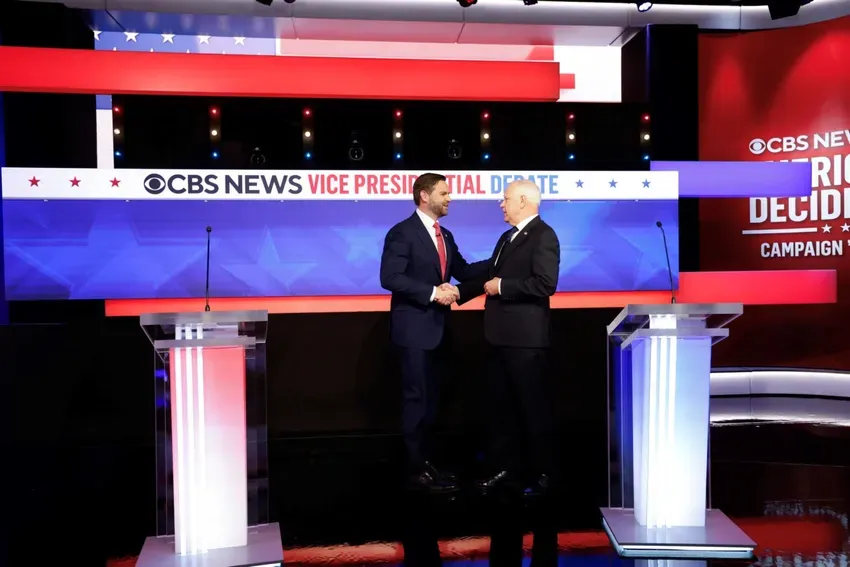On Tuesday, October 1, vice presidential hopefuls Tim Walz and JD Vance met on the debate stage in New York to support their party's nominees in what many call "the most polite debate" in this election cycle.
Though Vance seemed to control most of the conversation, he hit several snags, especially when a response showed a clear division between his personal view and Donald Trump's on key political issues. Although clunkier and sometimes prone to misspeaking, Walz held his own and seemed united with the Democratic base.
Middle East, climate change
The evening began with CBS's Norah O'Donnell and Margaret Brennan welcoming the candidates to the stage. They laid out the rules and then dove into the first question, about the Middle East. Gov. Walz was asked if he would support a preemptive strike against Iran by Israel as VP. Walz floundered as he tried to find his footing but, ever the politician, he evaded a clear response and instead voiced support for Israel and went on the offensive, citing concerns over Trump's ability to keep a level head in a time of crisis.
In his response, Vance stated several times that he wanted to "answer the question," then proceeded to recount his life story, justify his support of Donald Trump, and use his final seconds to reiterate Walz's stance that the US should support Israel's decisions.
With many topics to get to, the moderators quickly switched gears to discuss Hurricane Helene and the impact climate change has had on natural disasters. Both candidates politely agreed with one another that the hurricane had been devastating. They seemed to differ on the root causes of climate change, though Vance insisted that Trump's campaign does not deny it is real.
"I've noticed some of our Democratic friends talking about carbon emissions. This idea is that carbon emissions drive all climate change – well, let's just say that's true, so we're not arguing about weird science," Vance said at one point. Instead of delving further into what he meant by "weird science," Vance turned the tables on the Harris campaign, arguing that the best way to control emissions is to create more American energy jobs.
Walz rebutted this by reminding audiences that despite Vance's claims, Trump has referred to climate change as a hoax in the past. He also noted that as VP, Harris has helped to create more energy jobs in America and that her economic plan will continue to do so. He also pointed to his home state of Minnesota – a strategy Walz leaned on throughout the debate – to point out how his leadership has increased manufacturing jobs.
Like most of the rest of the night, the candidates seemed to agree on many of the points their opponent made, only arguing over minute details and differences in strategies.
Immigration and the economy
The moderators then moved the conversation to immigration. Vance criticized Harris for Biden's reversal of Trump-era immigration policies, which he claimed has caused "a historic immigration crisis." Vance claimed that Harris's policies – including suspending some deportations, decriminalizing some undocumented immigrants, and increasing accessibility to asylum seekers – have created an increase in fentanyl in the United States. He also continued to claim that immigrants are stealing jobs from American citizens and that migrants are using children as "drug mules."
Walz responded by saying that Harris is tough on the border, pointing out that she helped craft a bipartisan border bill that was killed in Congress after Trump allegedly feared passing it would take away one of his main campaign points. "What would Donald Trump talk about if we did some of these things?" he asked.
Walz also brought up the dehumanization that happens with racist rhetoric used to talk about immigration, citing Vance's admittedly made-up story about Haitian immigrants eating cats and dogs in Springfield, Ohio, which Trump mentioned in his debate with Harris.
Vance responded to the claims about Springfield, doubling down in his insistence that the town is "overrun" by undocumented immigrants. "Walz brought up the community of Springfield, and he's very worried about the things that I've said in Springfield," he said. "Look, in Springfield, Ohio, and in communities all across this country, you've got schools that are overwhelmed, you've got hospitals that are overwhelmed, you have got housing that is unaffordable because we brought in millions of illegal immigrants to compete with Americans for scarce homes."
Walz doubled down on his insistence that dignity must be central when enforcing border security. Before moving on to the next topic, Brennan reminded viewers that the Haitian migrants in Springfield have temporary protected status, making them legal migrants.
"Margaret, the rules were you weren't going to fact-check," Vance complained. He then went on to mansplain the legal migration process that applies to the immigrants living in Springfield.
"Thank you, Senator, for describing the legal process," Brennan said as she attempted again to steer the conversation back on track. Both Vance and Walz continued to argue about the issues, leading Brennan to cut their mics and read the next question.
On the economy, Walz described Harris's plan to make childcare and homeownership more affordable, dancing around O'Donnell's original question about the anticipated $1.2 trillion increase to the nation's deficit, which the Wharton School predicts will happen if her plans are enacted.
Similarly, Vance danced around the question of how the Trump administration plans to fund its economic goals, which the Wharton School predicts will increase the deficit by $5.8 trillion. Instead of providing an answer, Vance attacked Harris, stating that she did not pass any economic reform as vice president, and thus would be unable to do so as president.
Semantics and decorum
Throughout the debate, the candidates resorted to semantics, whether it was in the wording of an abortion protection bill signed by Walz, the cause of rising inflation, or the use of federal lands. Walz and Vance seemed to agree on many topics and treated each other with decorum. When discussing gun control, Walz mentioned that his 17-year-old son was a witness to gun violence, to which Vance responded with sympathy. They continuously targeted their animosity toward the opposing presidential candidate but avoided the ad hominem attacks debates have become known for this election cycle.
One of the reasons Harris selected Walz as her VP was to appeal to moderate voters in swing states, especially in the Midwest. At times, Walz sounded more Republican than Vance, but for the most part, continued to come off as a dad with a heart of gold. Though Trump's decision to run with Vance was more to appeal to his MAGA base and less an attempt to sway swing voters, the senator used the skills he developed at Yale to appeal to a moderate base. He avoided direct attacks on abortion and even evinced some support for common-sense gun control.
However, as moderators pointed out toward the end of the debate, Vance knows how to say what people want to hear. Though he previously spoke out against Trump – going so far as having called his running mate "America's Hitler" – he now fully supports him.
The last election
As the debate wrapped up, O'Donnell asked Vance if he would refuse to certify the election. Once again evading a straight answer, Vance described January 6 as a "protest" and defended Trump, claiming the former president only called for peaceful protest.
Walz attempted to set the story straight, pointING out that the violence and chaos that ensued was sparked by Trump's rhetoric and refusal to accept the election results. Vance then responded by claiming that Trump peacefully gave over power on January 20, 2021, and that "We are going to shake hands after this debate and after this election." Though Vance may have forgotten, Trump did not attend Biden's inauguration, nor did he shake his hand. However, Vance ended the debate by promising to respect and pray for Walz if he is selected as the next vice president.
Support the Seattle Gay News: Celebrate 50 Years with Us!
As the third-oldest LGBTQIA+ newspaper in the United States, the Seattle Gay News (SGN) has been a vital independent source of news and entertainment for Seattle and the Pacific Northwest since 1974.
As we celebrate our 50th anniversary, we need your support to continue our mission.
Your contribution will ensure that SGN remains a beacon of truth and a virtual gathering place for community dialogue.
Help us keep printing and providing a platform for LGBTQIA+ voices.
How you can donate!
Using this Link
Text "SGN" to 53-555
Or Scan the QR code below!



